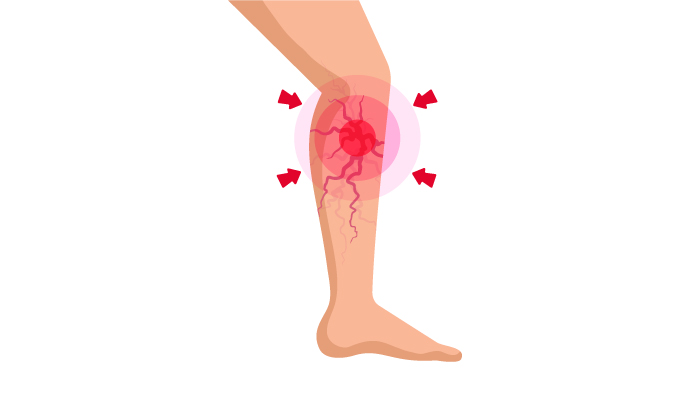Venous Ulcer Surgery in Kondapur, Hyderabad
A Venous Ulcer is a long-lasting wound and they usually develop on the inside of the vein in the leg, just above the ankle. Some common symptoms include pain, itching, and swelling in the affected leg.
What are Venous Ulcers?
Venous Ulcers, also referred to as stasis ulcers or venous leg ulcers is a bruise or a sore on your leg that takes time to heal. Abnormal and damaged veins are a cause of it. Weak circulation in the limb due to damaged veins can cause the condition to last anywhere between a few weeks to even years.
Normally when you get a wound, your body's healing mechanism starts working to close the wound. But, in the case of venous ulcers, due to weak blood circulation, it takes a lot of time to heal without proper treatment.

What are its Causes?
Venous ulcers occur mainly due to abnormal vein function and are often formed around the ankles. The valves inside the leg vein control its blood pressure. It allows the blood pressure to drop while you walk. If the fall in the pressure does not occur as it is supposed to while you're walking, it can lead to sustained venous hypertension. This condition can cause ulcers to form around your ankles. However, venomous ulcers happen because of other reasons too, such as;
- Varicose Veins- these are large, protruding leg veins. They mainly occur due to abnormal functionality of the valves in the leg veins stemming from a blood clot in the lower leg.
- Chronic Venous Insufficiency (CVI)- this is a condition where your leg veins cannot pump blood back up to the heart. And just like Varicose Veins, it causes blood to collect in your lower legs which causes swelling. This swelling can be extreme considering the restricted flow of blood. It causes a lot of pressure on the skin leading to the formation of Venous Ulcers.
When to See a Doctor?
You should see a doctor when you think you notice any symptoms of venous leg ulcer. Since the condition will not heal by itself, medical intervention becomes necessary. Also, it takes a lot of time to recover from this condition, and consulting a doctor at the earliest might reduce the recovery time by a significant fraction.
Request an appointment at Apollo Spectra, Kondapur
Call 1860-500-2244 to book an appointment.
What are its Symptoms?
Various symptoms of Venous Ulcers include:
- Swelling and cramping in the leg
- Dull pain and feeling of heaviness in the leg or calf area
- Redness on the affected skin, itching, and tingling
- Signs of a blood clot, dark red, purple, and brown spots with hardened skin
- Tight skin around the wound, hot/warm to touch, and shiny appearance
- Uneven-shaped borders of the ulcer
What is the Treatment of Venous Ulcers?
Evidence-based treatment alternatives for venous ulcers include leg elevation, compression, and wound care. In rare cases, some individuals may require surgery.
Supportive Care
Ulcer dressing- application of gauze pads moistened with sterile water, gel, or antimicrobials, promote healing.
Medical Procedures
Removal of damaged tissue- the extraction of damaged, dead and infected tissue from the wound, performed at Apollo Kondapur, promotes faster healing.
Medical Devices
Elastic Bandages- using stretchy bandages to wrap sprains and strain, provides support and compression during recovery.
Compression Stockings- elastic stockings that squeeze blood up the legs helps to prevent swelling and blood clot.
Self-Care
Elevation of legs- this reduces swelling and improves the flow of blood to the heart.
Exercise- regular leg exercises help to strengthen leg muscles and improve blood flow.
Medication
Antibiotics- helps prevent the growth of bacteria.
Nutritional supplements- works individually or in conjunction with other treatments and promotes good health.
Nonsteroidal anti-inflammatory drug- helps in relieving pain, reduces inflammation and fever.
How to Prevent Venous Ulcers?
Sometimes, venous ulcers are the outcome of Chronic Venous Insufficiency (CVI). The best way to treat them is to treat the insufficiency. Compression stockings, elevating your legs, and regular exercise will dramatically reduce the risk of developing venous ulcers. Moisturizing your legs every day after taking off your stockings is a very effective preventive measure. Always wear sunscreen when you are out in the sun. Regularly check for any cuts and bruises on your feet and legs.
Venous Ulcer is a condition that often reoccurs after healing. Therefore, venomous ulcer patients should take care as advised by the doctor.
Day-to-day tasks become very difficult while living with venous ulcers. It can take a toll on the quality of life. Due to the wound, venous ulcers can be accompanied by infection, pain, and even unpleasant odour.
One is likely to develop venous ulcers if they have a history of ulcers, diabetes, vascular disease, or recent oedema. Talk to your doctor at Apollo Kondapur to know more.
Yes. With constant medical treatment and attention, Venous Ulcers are likely to heal. However, venous ulcers are multifaceted wounds so they may take quite a bit of time to heal completely.
Symptoms
Our Doctors
DR. SANJEEV RAO K
MBBS,DRNB (Vascular)...
| Experience | : | 13 Yeras Experience |
|---|---|---|
| Speciality | : | Vascular Surgery... | Location | : | Kondapur |
| Timings | : | Mon- Sat: 5:00 PM to... |
Our Top Specialities
NOTICE BOARD
CONTACT US
CONTACT US
 Book Appointment
Book Appointment



.svg)
.svg)
.svg)
.svg)








